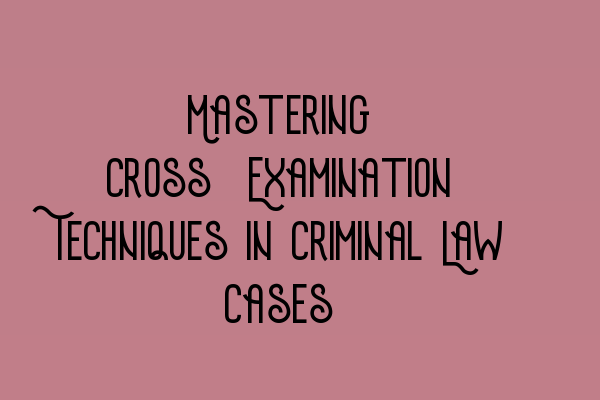Mastering Cross-Examination Techniques in Criminal Law Cases
Welcome to SQE Criminal Law & Practice Law UK’s blog post on mastering cross-examination techniques in criminal law cases. As a solicitor, mastering cross-examination is a crucial skill to have. It allows you to effectively question witnesses, challenge their credibility, and present a compelling case to the court. In this article, we will discuss key techniques and strategies that can help you become a master at cross-examination.
1. Preparation is Key
Before entering the courtroom, thorough preparation is essential. Familiarize yourself with the facts of the case, review witness statements, and study relevant legal precedents. This will enable you to craft well-informed questions and anticipate potential responses.
At SQE Criminal Law & Practice Law UK, we offer SQE 1 Practice Exam Questions and SQE 1 Practice Mocks FLK1 FLK2 to help you enhance your preparation skills and test your knowledge.
2. Establishing Rapport and Control
During cross-examination, developing rapport with the witness can help you elicit useful information and gain their trust. Establishing control over the witness’s responses is also crucial. Frame your questions carefully, using open-ended inquiries to encourage detailed answers, and closed-ended ones to obtain specific confirmations.
3. Leading Questions
The effective use of leading questions is a powerful tool in cross-examination. Craft questions that guide the witness to agree with your desired narrative. However, be cautious not to overuse leading questions, as it may diminish your credibility.
4. Impeaching Witness Credibility
Challenging the credibility of opposing witnesses is often a crucial aspect of cross-examination. Look for inconsistencies in their testimonies, previous statements, or any bias that may affect their objectivity. Use these discrepancies to cast doubt on the witness’s reliability.
5. Active Listening and Flexibility
While it’s crucial to stick to your strategic plan, cross-examination requires active listening. Be prepared to adapt and deviate from your planned line of questioning as new information unfolds during the witness’s testimony.
6. Practice and Feedback
Continuous practice is key to mastering cross-examination techniques. SQE Criminal Law & Practice Law UK offers comprehensive SQE 2 Preparation Courses and SQE 1 Preparation Courses to help you refine your skills. Our experienced instructors provide valuable feedback to enhance your performance.
Conclusion
Mastering cross-examination techniques is essential for success in criminal law cases. By investing time in preparation, building rapport with witnesses, leveraging leading questions effectively, challenging witness credibility, actively listening, and engaging in regular practice, you can become a skilled cross-examiner. Visit our website to find out more about our courses and stay updated on important SRA SQE Exam Dates.
We hope this article has provided valuable insights into mastering cross-examination techniques in criminal law cases. Feel free to contact us at SQE Criminal Law & Practice Law UK for further assistance and guidance.
